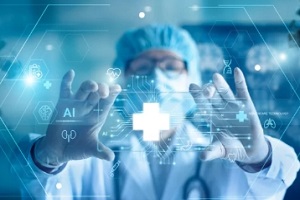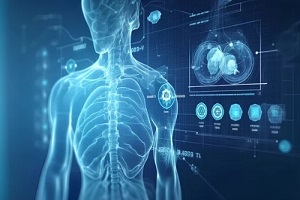Updated on: 3/26/2025
Key Takeaways
- AI’s Transformative Impact: AI is fundamentally changing healthcare delivery by enabling predictive, personalized, and preventive care through advanced data analysis, machine learning algorithms, and natural language processing, shifting from reactive to proactive healthcare approaches.
- Implementation Areas and Benefits: AI applications span multiple healthcare areas – from diagnostics and treatment planning to administrative tasks and medical education – offering benefits like improved accuracy, faster diagnosis, personalized treatment plans, and enhanced operational efficiency.
- Challenges and Requirements: While AI offers significant potential, successful implementation requires addressing key challenges including ethical considerations, data security, HIPAA compliance, and the need for proper integration with existing systems while maintaining the human element in healthcare.
Artificial Intelligence (AI) is bringing in a revolutionary era in the healthcare industry, shifting the paradigm from a one-size-fits-all approach to medicine to a more nuanced, predictive, personalized, and preventive holistic care model.
This transformation isn’t just some futuristic concept; it’s actively reshaping how healthcare providers, patients, and stakeholders interact, manage, and understand health and well-being.
With an ever-increasing volume of data generated from genomics, electronic health records, and wearable devices, the ability of AI to analyze and learn from complex datasets unlocks unprecedented opportunities in diagnosing, treating, and preventing diseases.
It’s paving the way for personalized medicine, where treatments and interventions are tailored to individual patients’ needs, preferences, and genetic makeup. Moreover, the predictive capabilities of AI enable healthcare professionals to take action before a condition escalates, thereby enhancing outcomes and reducing costs.
This article explores the impact of AI in healthcare, and its potential to transform the medical landscape into a more efficient, humane, and customized system, and examines the challenges that must be overcome to help usher in this new era of medicine.
Forecasting Health Issues In Predictive Care

Predictive analytics can flag risks of chronic conditions such as diabetes, heart diseases, or cancers at early stages, enabling timely intervention and potentially saving lives.
Tailoring Treatments To Individuals With Personalized Care
Personalized medicine, or precision medicine, is a burgeoning field that epitomizes the fusion of AI and healthcare. Through detailed analysis of a patient’s genetic makeup, lifestyle, and environmental factors, medical practitioners can now design treatment plans that are specifically tailored to the individual.
This granularity in care leads to increased treatment effectiveness and minimizing adverse effects. For example, oncologists can utilize AI-driven genomic sequencing to identify the exact type and mutation of cancer cells, subsequently prescribing targeted therapies that directly attack the cancerous cells without harming healthy tissues.
Personalized care also extends to creating unique wellness plans, emphasizing nutrition, exercise, and mental well-being, customized to an individual’s needs and preferences.
Enabling a Proactive Approach To Health With Preventive Care
Prevention has long been recognized as a vital aspect of healthcare, but it’s in the age of AI that prevention is coming to the forefront with renewed vigor. Preventive care focuses on maintaining health to avoid the occurrence of diseases rather than treating them post-diagnosis.
AI in preventive care employs wearable devices, IoT technologies, and mobile applications to monitor vital signs and lifestyle habits continually. Aberrations from the norm can be detected early, allowing for immediate interventions or lifestyle changes that can fend off potential health problems.
Whether it’s managing obesity through tailored fitness regimes or monitoring heart health in high-risk individuals, AI’s predictive analytics empowers healthcare professionals to intervene at the earliest signs of potential health issues.
Enhancing Accuracy & Speed With AI-Driven Diagnostics

In dermatology, AI has been employed to identify skin cancers with remarkable precision, enabling early treatments. In neurology, algorithms are assisting in the rapid detection of strokes or brain injuries, where timely intervention can be life-saving.
The Power Of Machine Learning Algorithms
Machine learning, a subset of AI, is reshaping the medical field by enhancing diagnostics, predictive analytics, and personalized medicine. It leverages algorithms that can quickly sift through complex and extensive clinical data to identify patterns, correlations, and trends. Some potential applications of this technology include:
- Precision Medicine: Machine learning helps predict the success of treatment procedures tailored to individual patient needs. Its effectiveness in healthcare is seen in supervised learning, where known results are utilized to analyze medical images and clinical data.
- Discovering New Therapies: From analyzing patient records to detecting subtle changes in vital signs, machine learning is being leveraged to discover innovative therapies, paving the way for more individualized treatments.
- Replacing Rule-Based Systems: Traditional rule-based systems in healthcare are gradually being replaced by machine learning approaches, which can interpret data using specialized medical algorithms without the limitations that large rule sets present.
Understanding The Role Of Natural Language Processors
The rise of deep learning in healthcare has seen its application in speech recognition, utilizing natural language processing, or NLP, a subset of machine learning. As this technology evolves, healthcare professionals must adapt to understand and effectively utilize deep learning models in their practice.
NLP’s integration into healthcare has provided an advanced mechanism for understanding and utilizing human language, with applications in:
- Diagnosis and Treatment Personalization: NLP has been instrumental in accurately diagnosing illnesses by extracting critical information from patient’s health data, including examinations and test results, thus further personalizing their treatments.
- Streamlining Clinical Processes: NLP has made healthcare processes much more efficient by readily managing large volumes of complex data, offering a more customized, timely service for patients.
Possible Ethical Considerations & Challenges

The reliance on algorithms also raises questions about accountability and transparency, particularly when AI-driven decisions lead to unexpected or undesirable outcomes. Developing trust among healthcare providers and patients, and creating a framework where AI is a supplement rather than a replacement for human expertise, will be vital in overcoming these challenges.
Ensuring that AI systems are transparent, secure, and accurate is essential to foster adoption and mitigate potential risks, so continuous ongoing efforts are needed to align AI technologies with ethical considerations and regulatory frameworks.
The Rise Of Telemedicine & Virtual Health Assistants
Telemedicine and virtual health assistants represent another frontier where AI is making inroads into healthcare. With the need for remote medical consultation burgeoning, particularly in the wake of global health crises like the COVID-19 pandemic, AI-powered chatbots and virtual health platforms are providing accessible and immediate healthcare advice.
These virtual assistants are capable of handling routine inquiries, guiding patients through symptoms, and even assisting with mental health support. These AI-driven systems are ensuring that quality healthcare extends beyond the confines of traditional medical facilities, reaching underserved and remote populations by augmenting human medical professionals.
Potential Administrative Applications
AI has the potential to transform many administrative aspects overseeing healthcare, including automating common tasks including data entry, claims processing, and appointment scheduling. This automation can help save valuable time and help reduce human error, enhancing efficiency in healthcare operations.
Ultimately, AI-powered tools enable healthcare providers to focus more on patient care, aligning resources effectively to deliver quality service.
Integrating AI In Healthcare Education
The transformational potential of AI extends beyond patient care into the education and training of healthcare professionals. Augmented by AI, simulation-based learning offers medical students and professionals a safe environment to learn, practice, and refine their skills.
Virtual patients, guided by AI, can mimic an extensive range of scenarios and responses, providing real-world experience without risking actual patient lives.
Continuous education, informed by AI’s ability to analyze and identify areas of weakness or growth, ensures that healthcare providers remain at the forefront of medical knowledge and practice, adapting to the rapidly evolving landscape of modern medicine.
Finding The Proper Partner For AI-Driven Development

Moreover, the evolving role of AI in healthcare education reflects a vital step in preparing the next generation of healthcare professionals to thrive in a technologically advanced environment. However, this transformative journey is not without challenges; ethical considerations, data security, and integration with existing systems must be thoughtfully addressed. Furthermore, the ongoing collaboration between technology companies, healthcare providers, and educational institutions is essential for harnessing the full potential of AI in healthcare.
Orases, with innovative solutions and expertise in custom software development, is at the forefront of these transformations. We understand the unique needs and complexities of the healthcare industry and are committed to delivering AI solutions that empower healthcare providers to offer more predictive, personalized, and preventive care. If you are seeking to leverage the power of artificial intelligence to improve healthcare outcomes, Orases is your ideal partner. Our team of experts is ready to collaborate with you in developing and implementing tailored AI solutions that align with your organization’s overall goals.
Contact us today to explore how we can help you transform healthcare through the intelligent use of technology, creating a future where technology and human expertise work hand in hand to enhance patient care and operational efficiency.






